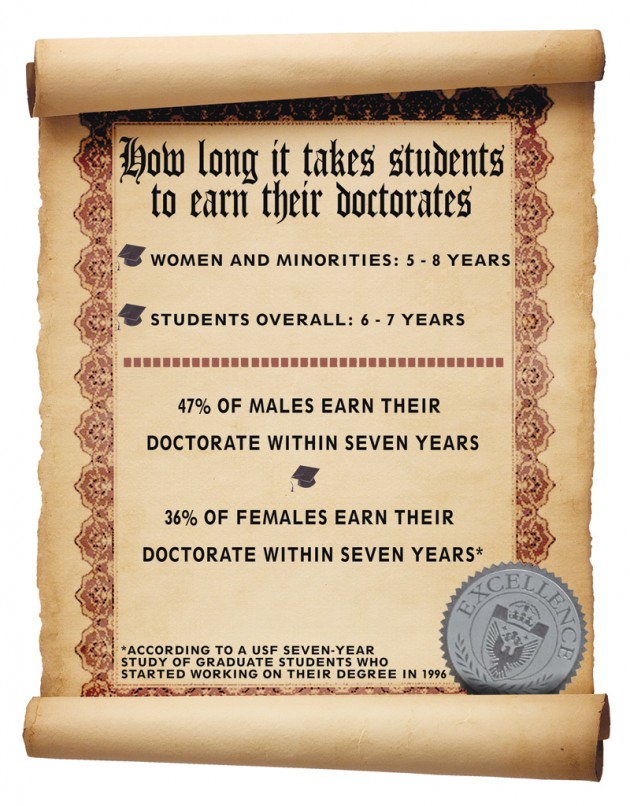Degrees of difficulty

Women and minorities typically have to wait a while longer than their white, male counterparts before adding “Ph.D” to their names.
A report by the Council of Graduate Schools stated that 25 percent of women nationwide completed their doctoral degrees sometime after their seventh year and before their 10th, compared to 18 percent of males who finished in seven to 10 years.
USF follows this trend, with women and minorities taking five to eight years to earn their doctorates. Meanwhile, the University’s average for all students is six to seven years. According to a seven-year study of graduate students who started their school year at USF in 1996, about 47 percent of males graduated within seven years while about 36 percent of females graduated in the same time frame, said Debbie Hayward, an employee in the Office of Decision Support.
A USF administrator credits this disparity to outside factors, such as raising a family and dealing with difficult economic situations.
Many women pursuing their doctorates are starting families and having to juggle academic and domestic demands, said Joan Homes, dean of the Graduate School.
“Women usually have to accommodate for their families, children and work while enrolled in school,” she said.
Though women take five to eight years to earn their doctorates, there are more women enrolled in the school than men. For every white male, there are two white females. For every black man, there are three black women and for every Hispanic male, there are four Hispanic females.
Not all women, however, take longer than five years. Chivon Mingo, 28, is getting her doctorate in aging studies and is on a five-year track to her degree. She is beginning her fourth year and is on track to earn her doctorate in the planned five.
“I did not come from a family of degrees, so the mentorship benefit with the fellowship program truly allowed me to complete my degree on time. Without it, it would have been more difficult, if not impossible,” she said. “The amount of information I have learned in the past four years, I wouldn’t have been able to attain any other way.”
Minorities also take five to eight years to earn their doctorates, and Holmes said that a culture shock sometimes causes these students to fall behind prematurely.
“Some minority students have to go through a cultural adaptation, where it is more difficult to acclimate to the (graduate school) environment,” she said.
Clausell Mathis, 27, pursuing a doctorate in physics, is one of the few black students in his field.
“I can feel somewhat out of my comfort zone at times because you don’t see many people like yourself, but there are good people within the department who will support you and get you on track to the finish line,” he said.
Economic and social circumstances are also big factors in the time it takes students to complete their degrees.
“After the fifth year of graduate school, funding tends to diminish,” Holmes said. “A lot of the minority students who are first-generation graduates don’t have the financial support from their families and must work, which prolongs their studies beyond seven years.”
USF’s Graduate School, however, has a higher-than-normal enrollment rate for minorities, Holmes said. Of the 8,968 students enrolled, 9 percent are black, 8.5 percent are Hispanic and 5 percent are Asian, which exceeds the national average of 5 to 6 percent minority enrollment in graduate school.
Among the various populations examined by the report, international students seemed most adept at completing their doctorates quickly. More than two-thirds of those who entered doctoral programs earned their doctorates within 10 years, and they were half as likely as domestic students to need more than seven years to finish.
At USF, however, Holmes said it’s difficult to compare international students to domestic students.
“A lot of international students are sponsored by their countries, allowing them to study for a period of time,” she said. “And some are simply trying to get back to their countries to return to their lives and because of these factors, the time taken to earn a degree is much faster.”
The council’s research also states that 60 percent of those who entered doctoral programs in the life sciences earned their doctorates within 10 years, leaving them tied with white doctoral students in this area. In other fields, however, black students fared much worse. In engineering, mathematics and physical sciences, they were substantially less likely than white, Asian or Hispanic candidates to complete their doctorates within 10 years, according to the report.
“Women are grossly underrepresented, along with minorities, in the math, physics and science departments,” Holmes said.
Fields of study such as education, life sciences and social sciences have the highest proportion of enrolled minority students.
“The reason that minority students do so well in those disciplines of education, life (science) and social science is because of the higher percentage of minorities within those fields,” she said.
The Council of Graduate Schools’ report was based on a study of 19,000 students from 24 universities in the U.S. and Canada.








